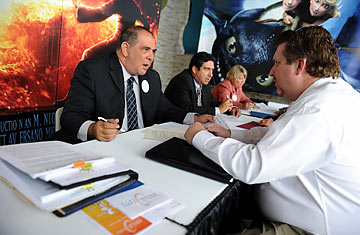
Resume counselor Frank Borzilleri, near left, helps job seeker Jay McWaters, right, fine-tune his resume at the second annual Anaheim/Orange County Job Fair in California on June 2, 2010
Members of both houses of Congress are fleeing the city for the July 4 recess, leaving behind an unfinished job but satisfied with the ideological positions it has allowed them to stake out. Unfortunately, indecision about the $3.5 billion bill to extend unemployment benefits is going to leave 1.3 million out-of-work Americans frustrated and anxious for at least another week. And with the economy losing another 125,000 jobs in June, the ideological goalposting only serves to dampen hopes for recovery. But the GOP lawmakers are happy to take home the news that they have held the line against deficit spending — while Democrats say that only proves the Republicans are pro–Wall Street obstructionists.
Senate majority leader Harry Reid has said the Senate will return to the issue when it reconvenes the week of July 12. But no positions are likely to change after Senators hear from their constituents over the break. Even if a replacement is named for the late West Virginia Democrat Robert Byrd, Reid would still be down a vote, so a compromise of some sort will have to be worked out.
That requires a proposal to offset spending to win over at least a couple of Republicans — an enormously difficult proposition. The GOP was once gun-shy about opposing an extension of unemployment insurance. In February and March, an extension of benefits was blocked by two Republican Senators, Jim Bunning of Kentucky and Tom Coburn of Oklahoma. Their party was a little chagrined at appearing hard-hearted about the unemployed: the holdouts were cowed into submission, and the extension passed.
Since then, however, public opinion seems to have stiffened the party's spine. In a March 2009 Washington Post–ABC poll, 52% of voters approved of the way President Obama was handling the federal deficit and 43% disapproved. In the latest poll, from April, those numbers have flipped, with 55% disapproving of Obama's handling of deficits and 40% approving — the largest swing on any issue. "The deficits are bigger and are of more concern now, and people have a greater sense of urgency about them than in the past," says Senator John Cornyn of Texas, who heads the National Republican Campaign Committee, which works to elect Republicans to the Senate.
And so the GOP is proudly declaring that while they have sympathy for the unemployed and would very much like to pass the benefits, they refuse to do so on the backs of their children and grandchildren. Deficit spending, they say, has gotten completely out of control; a line has to be drawn. In fact, some of the more libertarian ilk say workers have more incentive to settle for lesser-paid jobs when they're not subsidized by the government and that the benefits also hurt business.
On Wednesday night, June 30, after the last failed vote to extend benefits, Senate minority leader Mitch McConnell said, "We've offered ways of paying for these programs, and we've been eager to approve them. But we can't support job-killing taxes and adding tens of billions to the already unsustainable national debt." If Democrats were to pay for the bill using unspent stimulus funds or cuts in programs, Republicans say, they'd overwhelmingly vote for it.
Program cuts, however, are anathema to the Democrats. And they argue that taking money out of the $179 billion remaining in the stimulus kitty takes away from stimulating the economy at the exact time the government is trying to avoid a double-dip recession.
Yet the Democrats aren't completely unhappy about being stymied. They are using the impasse to portray Republicans as obstructionists on the side of Wall Street — at the expense of the little guy — ahead of the midterm elections. "Given the widespread economic angst felt out all over the country, Republicans who ignore it do so at their own peril," says Senator Bob Menendez of New Jersey, who heads the Democratic counterpart to Cornyn's group. "Since Day One of this Administration, Republicans have stood in the way of every Democratic attempt to get this economy moving again, and that is not something lost on voters."
Democrats have adopted markedly more militaristic language to make their point. The loss of 8 million jobs since December 2007 is easily as big an emergency as the wars in Iraq and Afghanistan, they argue, and therefore deserves the same unfunded status. "For those who question whether this is an emergency situation, they should talk to the Nevadans who I hear from every day who rely on this assistance to put food on the table and pay the bills while they look for work," Reid said. "I am hopeful that Republicans will finally understand the urgency of this crisis for millions of American families and join our efforts to extend this assistance that our workers deserve."
Digging in one's heels may help shore up the base, but it has turned the hundreds of thousands of unemployed into a political Frisbee, spun around and then abandoned on a lazy week in July.
